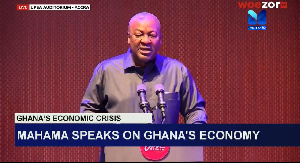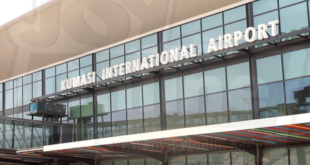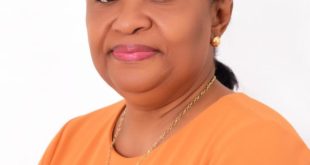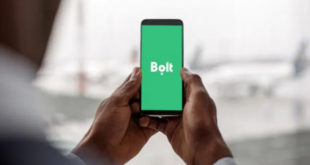THE MAHAMA 24-HOUR ECONOMY POLICY FOR GHANA’ SPEECH BY HE JOHN DRAMANI MAHAMA AT THE 9TH GHANA CEO NETWORK BUSINESS COCKTAIL
Thank you, and good evening, my dear brothers and sisters,
Captains of our industries, Chief Executives,
Ladies and gentlemen.
I am pleased to have a second opportunity to join you at your annual end-of-year cocktail. This networking event provides an excellent opportunity to share new ideas, knowledge, wisdom, and experiences.
And I mean experiences from Ghana that defy all the models and theories taught in Business Schools – because if you have survived this economy since 2018, then you are a successful global case study.
Like my first participation, I have enjoyed your warm friendship and insightful conversations and shared great ideas with many of you here tonight. Of course, my determination to transform Ghana’s economy into a 24-hour working economy featured prominently in the conversations.
But I cannot help but repeat the point made by one of the CEOs, with deep regret written on his face, that “we want to pay every legitimate tax, BUT the needless harassment from GRA must stop. Back-dated tax audits, re-audits and assessments based on the whims of the taxman are killing businesses”, he lamented.
Ladies and gentlemen, many businesses still bear the brunt of the economic meltdown. This is because, contrary to the Finance Minister’s assertion, we have not turned any corner, and 2024 will be a very challenging year. Many have shut down their businesses, and hundreds of thousands of laid-off workers are still at home.
Businesses that moved headquarters from Ghana to our neighbouring countries have yet to return. The poorly thought-through banking sector clean-up has left thousands of skilled financial sector workers, jobless and impoverished.
As I speak, the second tranche of the IMF’s Extended Credit Facility, due on the first of November, has still not been received because of a delay by our external creditors to sign off on our debt restructuring programme.
Of course, the consequences of our debt default have also started manifesting. For the first time in thirty years, Ghana struggled to assemble a cocoa-syndicated loan, which had almost become routine on our financial calendar. Major infrastructure projects have stopped because lenders have cut funding as a direct fallout from our debt default.
Independent Power Producers continue to threaten power cuts due to mounting debts affecting their operations. A few days ago, one of the producers threatened to take out 560 MW of power before a promise to pay was made. Ghanaians face grave uncertainty if more of them follow suit.
As a proud Ghanaian and a political leader, it is disheartening that the government has severely damaged our country’s reputation on the global stage.
Recent data from available research shows that the cost of living in Ghana is very high, and people are struggling to make ends meet due to the economic downturn. This includes pensioners who invested their savings in government bonds, hoping to enjoy a better retirement.
Business confidence remains low, with private sector credit declining in real terms. As of October 2023, credit to the private sector had decreased significantly by 31.6%. This is because of the government’s excessive borrowing over the last seven years and reliance on the short-term treasury market.
Lending rates increased to over 32% in October 2023 due to the Bank of Ghana’s tight monetary policy, high treasury bill rates, and rising non-performing loans.
The immutable reality is that the first three quarters of the year (2023) have also been a tragic period for Ghana’s industries, causing a setback for the country’s economic transformation. While the mining and quarry sector is still holding out, most sub-sectors, such as construction, electricity, water supply, sewerage, and waste management, have experienced a decline.
These are clear signs of an ailing economy— an economy whose industrial base is failing and businesses collapsing with growing unemployment and its associated poverty and misery. Unemployment remains high, with the latest data indicating about 14%.
Meanwhile, the 2024 budget and financial estimates of the government presented to parliament have introduced, yet again, a raft of taxes that will only add to a list of already burdensome taxes. These taxes, combined with very high interest rates, will further whittle away the capital of Ghanaian businesses and hinder their competitiveness.
The economic crisis has ravaged all of us, but as business leaders, you have a deeper appreciation of the current situation. Paraphrasing Bob Marley and the Wailers, “who feels it, knows it.”
Undoubtedly, the economic catastrophe we face is self-inflicted and caused by this government! However, for the sake of Ghanaians and the future of our dear country, we cannot allow the status quo to continue.
As flagbearer of the National Democratic Congress, I have put forth several proposals to ensure that the economy is returned to a stable footing and that economic activity is expanded for job creation and growth.
I have committed the future NDC government to stringent enforcement of prudence and fiscal discipline in public financial management. Government expenditure will be cut and streamlined by significantly reducing the number of overlapping agencies and amorphous creations of this NPP administration.
As I noted at last year’s event, we cannot fail to learn from the present economic catastrophe. This crisis shows there is no substitute for prudent financial management.
Ladies and gentlemen, we are faced with a triple helix problem that threatens the stability of our democracy, namely, a financial crisis, severe unemployment, and unprecedented levels of corruption. Without an economic revamp, we cannot hope to make any mark in our massive unemployment crisis, which is leading many of our young people down the road of despair.
Research shows that unemployment, unavailability of jobs, poverty, high cost and poor living conditions are issues of grave concern to many Ghanaians.
Chief Executives, business owners, ladies and gentlemen, we cannot continue the business-as usual way of doing things. We must think outside the box. We must enhance efficiency by optimising available resources, including infrastructure and human resources.
Ghana must work efficiently!
The restless quest for efficiency to solve our financial and unemployment problems is why I have emphasised that more than the traditional and regular methods of economic activity would be needed to revitalise our economy.
My next administration will pursue projects and programmes to transform Ghana into a fully-fledged 24-hour economy by optimising available resources.
I acknowledge the massive support for the idea of a 24-hour economy by the Trades Union Congress, Civil Society Organizations, Journalists, Lecturers, Labour Consultants, CEOs and Captains of industry, personnel from the creative arts industry, drivers, traders, and the teeming unemployed youth of Ghana.
God willing, from January 7, 2025, we shall implement a series of TRANSITION MEASURES to address the economic decline and set Ghana on the path to recovery.
The proposed 24-hour economy forms part of the NDC’s vision to build the Ghana We Want. Let me reiterate that our quest to build the Ghana we want together with you will be premised on:
Building an industrialised, inclusive, and resilient economy that creates well-paying jobs,
Creating an equitable, healthy, and prosperous nation,
Developing well-planned, safe communities while protecting the natural environment,
Building effective, efficient, and dynamic institutions for national development; and § Strengthening Ghana’s role in African and international affairs.
Ladies and gentlemen, the 24-hour economy may have finally resonated with Ghanaians. It may be classified as an idea whose time has come due to Ghana’s self-inflicted economic crisis today because the 24-hour economy initiative was well-thought-through and captured on page 105 of the NDC’s 2020 People’s Manifesto.
Indeed, its roots emanate from the 40-year National Development Plan the National Development Planning Commission (NDPC) put together when I was President. Unfortunately, the present government discarded the 40-year plan and replaced it with a Ghana Beyond Aid plan that has turned Ghana into a beggar nation.
Stripped to the essentials, ladies and gentlemen, the 24-hour policy will be anchored as an economy that runs around the clock with a three-shift work schedule in many sectors. The intent is to transform Ghana into, first, a self-sufficient and then an export-led economy.
To be clear, we are not creating a command economy with centralised planning. That would be at variance with the Social Democratic ideology of the NDC.
Specifically:
We will combine government support and private sector involvement to realise the 24hour economy.
We will establish a comprehensive policy framework that supports the growth of a 24hour economy.
Legislation will be introduced to support businesses operating 24/7, including labour laws, tax incentives, and regulations that ensure workers’ rights and protection.
Favourable tax policies will be adopted so that businesses can reduce their operational cost and stay competitive.
Companies that sign up for the 24-hour economy policy will enjoy smart metering calibrated to charge a lesser tariff (per KW/h) for power consumed during off-peak hours at night based on a Time of Use (ToU) tariff system.
Financing support will be provided for certain strategic agro-processing firms and manufacturing companies to boost production for value addition, self-sufficiency, and increased exports.
Knowing that the government is the biggest spender in the economy, we shall boost demand by ensuring that all government ministries, agencies, assemblies, and stateowned enterprises buy made-in-Ghana goods and procure the services of Ghana-based firms where available.
We will address safety and security measures to ensure smooth operations across all sectors during extended hours.
We will see the availability of the necessary infrastructure, such as transportation networks, public amenities, and security systems, including a well-regulated and monitored private security architecture to facilitate round-the-clock activities.
Technology and digital infrastructure investment would also be prioritised to enable automation and seamless operations.
We cannot have a successful 24-hour economy without an aggressive expansion in our exports.
I will, therefore, personally chair an Accelerated Exports Development Council (AEDC), which will meet quarterly to review initiatives for expanding Ghana’s exports under the ECOWAS Trade Liberalization Scheme (ETLS) and the African Continental Free Trade Agreement (AfCFTA).
There will be extensive consultation and collaboration with various stakeholders, including CEOs, businesses and workers’ unions.
Businesses will be encouraged to empower the workforce with the necessary skills and training to thrive in a 24-hour economy, focusing on the most impacted sectors.
Sanitation, cleaning services, garbage collection and environmental protection will also form a significant part of the 24-hour economy.
Financial services at the port, shipping agents, and customs will be enabled to work additional shifts at night and at weekends to allow for the 24/7 clearing of goods at our ports. This will help reduce demurrage charges on importers and reduce congestion at our ports.
My brothers and sisters, there will be no limit to the sectors the 24-hour economy initiative will target. And the benefits will be enormous. Through the 24-hour economy, we will create new, decent, and well-paying jobs for the youth, reduce unemployment, which is a significant challenge, and improve the living standards of Ghanaians.
Also, the expanded range of operating or working hours will increase productivity and fully utilise all resources, including infrastructure. The 24-hour economy will provide greater flexibility and convenience for workers and allow citizens to access goods and services anytime.
We will improve infrastructure, lighting, and security at entertainment districts such as the Osu Oxford Street, Abeka LaPaz, East Legon Lagos Avenue, etc., to allow operations throughout the night – Consider hospitality, transportation, and security, including a well-regulated and monitored private security establishment. These will enhance the consumer experience and create a thriving and dynamic economy.
Let me add that the 24-hour economy will also attract foreign direct investment to stimulate the local economy and create more employment opportunities for Ghanaians.
We would wage a strong fight against corruption to reduce waste and save money for reinvestment in the economy. The sword of the fight against corruption will cut both ways – against past government officials, officials of the incumbent administration, civil and public servants, businesses, government suppliers, etc.— if they fall foul of the law.
We would review our laws governing the extractive industry so that Ghana can increase its share and local participation in exploiting our natural resources.
I believe that with improved revenues from the savings made from a reduced size of government, the anti-corruption fight, fast-tracked operationalisation of new oil and gas wells, increased investment in the mining sector and a revamped cocoa sector, we can ease the heavy burden of tax that has been placed on Ghanaian households and businesses.
Ladies and gentlemen, we in the NDC have never claimed to be repositories of all knowledge, and so we look forward to the mutual sharing of ideas and insights with you as we have done here tonight. We need to network more, and I look forward to another opportunity where I can sit and interact, take your questions, share more thoughts, and imbibe your suggestions to tackle our collective problems.
When entrusted with the governance of this country and the management of the economy, I pledge on behalf of the NDC to stay the course of prudence to maintain stability and predictability in the economy.
Incidentally, today is December 7, and a year today, we would have begun counting and tallying the results of the Presidential and Parliamentary elections. By this time, Ghana will be preparing for the results of a decisive election for CHANGE. We are confident that the survival of businesses like yours depends on a stable macroeconomic environment. It will also depend on the need for change next year.
I remain optimistic about the Mahama 24-hour economy initiative.
In a rapidly advancing global economy, in which countries worldwide are gradually drifting and adopting 24-hour economies to remain competitive and attract investments – Ghana cannot be left out.
With increasing urbanisation, where many previously rural communities are becoming urbanised with its associated higher demand for goods, including food, beverages, and services around the clock – Ghana cannot be left out.
With an expanding services sector in which healthcare, tourism, entertainment, Business Processing Outsourcing and Call Centres have the potential to operate optimally and continuously – Ghana cannot be left out.
With technological advancements enabling communication, coordination, and transactions at any time, making it easier for businesses to operate 24 hours, seven days a week – Ghana cannot be left out.
Finally, my dear CEOs, let me assure you that we shall pursue initiatives that allow the private sector to flourish consistently and visibly and in a way that improves upward socio-economic mobility and social justice.
My commitment is to stop the excessive and direct competition between the government, its agencies, and cronies with private businesses through dubious restriction mechanisms and aggressive business regulation.
The 24-hour economy is a game-changer for the Ghanaian economy. It will benefit your businesses, employment and the enjoyment of the youth who are seeking jobs.
We shall vigorously pursue the 24-hour economy, amongst many other initiatives, as part of our broader vision and determination to increase economic growth, create jobs, and improve the quality of life of Ghanaians.
We shall work with you to build the Ghana we want together.
Thank you, and Merry Christmas.
Source: johnmahama.org
 Home Of Ghana News Ghana News, Entertainment And More
Home Of Ghana News Ghana News, Entertainment And More





